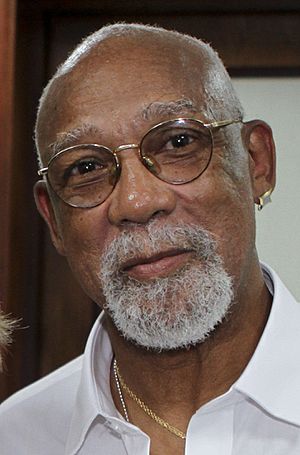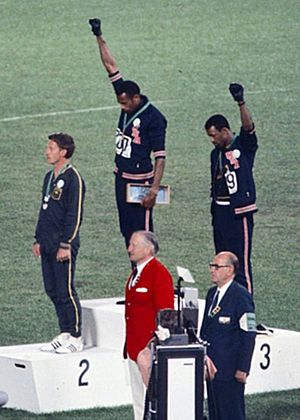John Carlos facts for kids

Carlos in 2012
|
||||||||||||||||||||
Quick facts for kids Personal information |
||||||||||||||||||||
|---|---|---|---|---|---|---|---|---|---|---|---|---|---|---|---|---|---|---|---|---|
| Born | June 5, 1945 New York City, U.S. |
|||||||||||||||||||
| Height | 6 ft 4 in (1.93 m) | |||||||||||||||||||
| Weight | 187 lb (85 kg) | |||||||||||||||||||
| Sport | ||||||||||||||||||||
| Sport | Sprint running | |||||||||||||||||||
| Club | Santa Clara Valley Youth Village | |||||||||||||||||||
| Achievements and titles | ||||||||||||||||||||
| Personal best(s) | 100 y – 9.1 (1969) 100 m – 10.0 (1968) 200 m – 19.92 (1968) 440 y – 47.0 (1967) |
|||||||||||||||||||
|
Medal record
|
||||||||||||||||||||
John Wesley Carlos (born June 5, 1945) is an American former track and field athlete. He also played professional football for a short time. He is best known for winning a bronze medal in the 200 meters at the 1968 Summer Olympics. During the medal ceremony, he and fellow athlete Tommie Smith made a powerful statement. They raised their black-gloved fists in what became known as the Black Power salute.
Carlos also achieved impressive records in track. He tied the world record in the 100-yard dash. He also beat the 200 meters world record, though this record was not officially recognized. After his track career, he played briefly in the Canadian Football League. He had to stop playing due to an injury.
Later, John Carlos worked with the United States Olympic Committee. He helped organize the 1984 Summer Olympics in Los Angeles. He then became a track coach at Palm Springs High School. In 2003, he was honored by being inducted into the USA Track & Field Hall of Fame. He also co-wrote a book about his experiences.
Contents
Early Life and Athletic Beginnings
John Carlos was born in The Bronx, a part of New York City. He grew up in the Harlem neighborhood. His mother, Violis, was born in Jamaica. Her parents were Black Cuban and lived in Santiago, Cuba. His father, Earl V. Carlos Sr., was from South Carolina.
Carlos showed great talent in track and field early on. He competed in a 200-meter dash. He was also part of a 4×400-meter relay team. This team helped East Texas State University win the 1967 Lone Star Conference Championship. After his first year, Carlos moved to San Jose State University. There, he was coached by Lloyd (Bud) Winter, who later joined the National Track & Field Hall of Fame.
John Carlos has received several special honors for his achievements. In 2008, he was given an honorary doctorate from California State University. In 2012, he received more honorary doctorates. These came from his former schools, Texas A&M University-Commerce and San Jose State University.
The 1968 Olympics and a Powerful Protest
The 1968 Olympic Trials took place in California. They were held at Echo Summit trailhead. This location is high up, similar to the altitude of Mexico City. Carlos won the 200-meter dash in 19.92 seconds. He even beat the world-record holder, Tommie Smith, by 0.3 seconds. His record was not officially recognized because of the special spikes on his shoes. However, this race proved he was a top sprinter.
Carlos became a founder of the Olympic Project for Human Rights (OPHR). This group wanted to bring attention to human rights issues. At first, they suggested boycotting the 1968 Mexico City Olympic Games. They had four main demands. These included removing South Africa and Rhodesia from the games. They also wanted Muhammad Ali's boxing title back. Another demand was for Avery Brundage to step down as president of the IOC. Finally, they wanted more African-American assistant coaches.
The boycott did not get enough support. However, the IOC did remove invitations for South Africa and Rhodesia. Carlos and Smith then decided to participate in the Games. They planned to protest if they won a medal. Carlos finished third in the 200 meters. Tommie Smith won gold, and Australian Peter Norman won silver.

At the medal ceremony, Carlos and Smith made headlines worldwide. They raised their black-gloved fists. This was a symbol of Black Power. Both athletes also wore black socks and no shoes. This was to show the challenges faced by many African-Americans. Peter Norman, the white silver medalist from Australia, supported them. He wore an OPHR badge on his uniform.
The president of the International Olympic Committee (IOC), Avery Brundage, did not approve. He said it was a political statement. He believed the Olympics should be free of politics. Brundage ordered Smith and Carlos to be suspended from the US team. He also banned them from the Olympic Village. When the US Olympic Committee refused, Brundage threatened to ban the entire US track team. This led to Smith and Carlos being removed from the Games.
A spokesperson for the IOC called their actions "a deliberate and violent breach of the fundamental principles of the Olympic spirit." Brundage had been president of the United States Olympic Committee in 1936. He had not objected to Nazi salutes during the Berlin Olympics. He argued that the Nazi salute was a national salute. He said it was acceptable in a competition of nations. But the athletes' salute was not of a nation, so he found it unacceptable.
John Carlos had an amazing year in track and field in 1969. He equaled the world 100-yard record of 9.1 seconds. He also won the AAU 220-yard run. He helped San Jose State win its first NCAA championship. He won the 100 and 220-yard races. He was also part of the winning 4×110-yard relay team. He was featured on the cover of Track and Field News magazine in May 1969.
He also won a gold medal at 200 meters at the 1967 Pan American Games. This event was held in Winnipeg, Manitoba, Canada. He set indoor world bests too. These included 5.9 seconds in the 60-yard dash and 21.2 seconds in the indoor 220-yard dash.
The 1968 Olympics happened during a time of big changes. The Civil Rights movement was very active. Martin Luther King Jr. was assassinated in April 1968. The Fair Housing Act was passed that same month. Many protests were happening across the country. People were speaking out about the Vietnam War and human rights. The 1968 Olympics were shown on TV and radio around the world. This gave athletes a huge platform. They could share their thoughts on important issues with a global audience. Peaceful protests by popular athletes are still common today.
Life After the Olympics
After his track career, John Carlos tried professional football. He was chosen in the 1970 NFL draft. He tried out for the Philadelphia Eagles of the National Football League. However, a knee injury stopped him from continuing. He then played one season for the Montreal Alouettes in the Canadian Football League.
After retiring from football, Carlos worked for several organizations. These included Puma, the United States Olympic Committee, and the organizing committee for the 1984 Summer Olympics. He also worked for the City of Los Angeles.
In 1985, Carlos became a counselor at Palm Springs High School in California. He also coached the track and field team there. In 2003, he was inducted into the National Track & Field Hall of Fame.
In 2005, a statue was created to honor Carlos and Smith. It is called Victory Salute. The statue shows them on the medal stand. It was made by artist Rigo 23 and is on the campus of San Jose State University.
In 2006, John Carlos gave a speech at Peter Norman's funeral. He was also one of the people who carried the coffin. Tommie Smith was also a pallbearer. In 2007, John Carlos was honored at the Trumpet Awards in Las Vegas, Nevada.
Carlos is the godfather of Chicago White Sox General Manager Kenny Williams. Carlos ran track with Williams's father in college.
In April 2008, Carlos carried the Human Rights Torch. This torch relay happened at the same time as the 2008 Summer Olympics torch relay. It aimed to bring attention to China's human rights record.
On July 16, 2008, John Carlos and Tommie Smith received a special award. They accepted the Arthur Ashe Award for Courage for their salute. This was at the 2008 ESPY Awards in Los Angeles, California.
On October 10, 2011, Carlos spoke at Occupy Wall Street. He raised his fist there. He told the crowd, "Today I am here for you. Why? Because I am you. We're here forty-three years later because there's a fight still to be won. This day is not for us but for our children to come." He also appeared on TV shows the next day.
Awards and Recognition
- World Athletics Awards - President's award:2020
See also
 In Spanish: John Carlos para niños
In Spanish: John Carlos para niños

